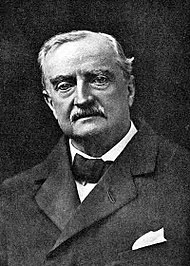Speech by John Bruton, Former Taoiseach and Vice Chairman of Co-operation Ireland, at a meeting in the Houses of Parliament in Westminster at 6 pm on Tuesday 7th March, commemorating the centenary of the death, on 6th March 1918, of John Redmond MP, Leader of the Irish Parliamentary Party:
……………………………………………………………………………………………………………….
I wish to thank Sir Jeffrey Donaldson MP, and Conor McGinn MP, for organising, with the support of Co-operation Ireland and the Irish Embassy in London, this commemoration of the life and service of John Redmond.
I thank Christopher Moran, Chairman of Co-operation Ireland, for making this commemoration happen. When Christopher decides something is going to happen, it happens!
THE REDMOND FAMILY IN PARLIAMENTARY POLITICS
John Redmond was as an MP here from January 1881 right up to his death on March 6th 1918.

John Redmond MP who passed away on March 6th 1918
He worked briefly as a clerk in the House, before he became an MP.
His father had been an MP from 1872 to 1880, and his uncle, and namesake, was a member from 1859 to 1865.
His brother, Major Willie Redmond, served alongside him in the House of Commons from 1883 until 1917 when he died, as a 56 year old volunteer in the Royal Irish Regiment, from wounds he suffered in the Battle of Messines Ridge.
John’s son, also William Redmond, who also later served on the Western Front, had been elected as an MP in 1910. He successfully defended his deceased father’s seat in the Waterford by Election of 1918.
He won the Waterford seat again in the General Election of the same year, becoming the only elected Nationalist MP from Southern Ireland to take his seat here, which he did until the Treaty of 1921. He later became a member of Dail Eireann.
THE CHARACTER OF JOHN REDMOND
In a recent biography, Alvin Jackson, Professor of History in Edinburgh University describes John Redmond as
“patient, careful, consensual-but occasionally capable of necessary anger, who held together, from a position of weakness, a national enterprise (Home Rule) which he brought to the cusp of victory in 1914.”
Dermot Meleady, my fellow speaker at this event, and the author of a comprehensive two volume life of Redmond, has recently edited Redmond’s vast correspondence. This correspondence illustrates the huge practical difficulties Redmond faced, in holding together, and servicing, the numerous constituencies he had to mobilize to achieve Home Rule.
To exercise influence in Westminster, he had to spend a lot of his life in London.
To mobilise, occasionally dubious, British Liberal opinion behind Home Rule, he had to address meetings all over the rest of Britain. Forinstance, in 1907, he addressed the Oxford Union on a motion favouring Home Rule. After his address, the local Oxford newspaper said
“It is doubtful if the Union has ever heard, or will hear again, a speech that will have such influence on its hearers.”
In this work in Britain, he was greatly assisted by an Irish Party MP, who represented a Liverpool constituency, TP O Connor.
To bring Irish public opinion along in the compromises he needed to make to achieve Home Rule by constitutional methods, he had to spend a lot of time in Ireland. Here the role of his Deputy Leader, John Dillon, who spent more time in Ireland that Redmond could, was vital. They complemented one another.
To raise funds and exert pressure on the UK government, he had to travel often to the United States and Australia. In fact it was on a fund raising trip for the Party that he met and married his first wife, Johanna Dalton.
All this travel and stress eventually took a toll on his health, and contributed to his death, at the relatively young age of 61.
Born to a well off family, John Redmond lived modestly, but died a comparatively poor man, because he put public service ahead of his own and his family’s financial interests.
REDMOND’S SUCCESS AS A POLITICAL LEADER
Travel and communications were much more difficult then, so a lot of Redmond’s negotiations were done by letter.
The correspondence Dermot Meleady publishes shows how Redmond was instrumental in seeking to avoid, and eventually in healing, the damaging split between Parnellites and anti-Parnellites.
In 1890, Redmond stood by Parnell, a stance that Carson always admired.
But, by 1900, he was the one chosen lead a reunited Irish party, the majority of whom had been opponents of Parnell and, by extension, of Redmond himself. Redmond was able to succeed in this because he had won the trust of his opponents, as well as of his friends. These same qualities enabled to win over sceptical British opinion to the idea of Irish self government.
Redmond’s career is sometimes presented as a tragic and unlucky failure.
This is not so. Taken as a whole, his career was a success. He achieved much.
ENDING THE LORDS VETO
In the 1909 to 1914 period, he successfully used his pivotal votes of his Party, on which the survival of the Liberal government depended, to insist upon the end of the parliamentary veto of the House of Lords, a major constitutional achievement.
When one considers the slow progress made by successive UK governments since then, often with large parliamentary majorities, in Lords Reform, one gets a sense of the scale of achievement by Redmond, who led a Party that was always in a minority.
To end the Lords veto, Redmond needed nerves of steel in his negotiations between 1909 and 1911. Such was John Redmond’s success that the Daily Mail, with its characteristic understatement when it comes to Irish matters, described him as “the Dictator from Dublin”. He had to exert discipline in his party, and recent academic analysis shows the Irish Party to have been the most active, disciplined, and cohesive party in the House.
Of course the abolition of the House of Lords veto was not an end in itself.
ENACTING HOME RULE
It was a means to an end, and the end Redmond sought was Home Rule for Ireland.
Under the terms of the Parliament Act of 1911, which ended the Lords veto, Redmond had to ensure that the House of Commons passed a Home Rule Bill, in identical language, three times in three successive parliamentary sessions in 1912, in 1913 and again in 1914.
Again this required the consistent application of parliamentary pressure. He had to ensure that the Liberal government did not take his support for granted, but equally he also had to ensure that the Liberal government survived, for, if the Liberals fell, the replacement government would have abandoned Home Rule.
Through this application of democratic parliamentary pressure, Redmond and his Party succeeded, on 18 September 1914, in having Parliament to enact Home Rule for Ireland, and in having it signed into law by the King.
It is very important for Irish people to remember, in this centenary week of Redmond’s death, that previous Leaders of Irish Nationalism, O Connell, Butt and Parnell had not succeeded in having Home rule become law. Redmond did.
And, unlike them, he faced the real prospect of unconstitutional armed resistance in Ulster.
The enactment of Home Rule, and its signature by the King, meant that the UK Parliament, and its Sovereign, had consented to the principle of Irish legislative independence. This was done long before a shot was fired, long before the first unarmed policeman was shot at gates of Dublin Castle on Easter Monday of 1916, and long before the killing of policemen recommenced, on a much larger scale in 1919.
The principle of legislative independence had been won before a shot was fired.
AND WINNING CONSENT TO IT FROM ALL PARTIES
By 1915, all parties in Westminster, including the Conservatives, had come around to accepting that legislative independence, for at least 26 of the counties of Ireland, was both inevitable and necessary. As a result, Home Rule was the policy of all the major parties, including the Conservatives, in the General Election of 1918.
All this was done without taking anyone’s life.
LEAVING THE UK CUSTOMS UNION?
One of the big controversies surrounding Home Rule was about whether the Home Rule government would have power to set and collect Customs duties, as well as other taxes. In other words, would Home Rule Ireland leave the UK Customs Union, or not?
Just as the UK is now finding that leaving the EU Customs Union has costs as well as benefits, Redmond found that leaving the UK Customs Union, one hundred years ago, would not have been without political difficulty.
Industrialised North East Ulster argued strongly, in the debates about Home Rule, that a government in Dublin should not be allowed to leave the UK Customs Union. They feared that if it did, it might use customs tariff powers to favour other parts of Ireland, to Belfast’s disadvantage.
Indeed, if the Home Rule Act had included customs powers, one might have had the same controversies, about checks at ports and borders a hundred years ago, that we are having today
Redmond wanted to avoid partition, and wanted to minimise differences with Unionism, so he was prepared to cede ground on the customs issue and accepted that Home Rule would not include customs powers.
Other nationalists took a harder line and, in the end, they got their way.
After the violence of the 1916 to 1921 period, the Treaty of 1921 took the 26 counties out of the UK Customs Union. The Free State government took on the power to impose protectionist tariffs. That inevitably meant border posts. Customs sovereignty came at a price.
Home Rule was not brought into immediate effect in September 1914, after it was enacted, because holding an election to the new Irish legislature and setting up a new government would have been difficult, given the distractions caused by the outbreak of the First World War in the previous month. Initially, this postponement was not controversial at all.
EXCLUSION OF ULSTER COUNTIES…TEMPORARY, REVERSIBLE, OR INDEFINITE?
But the possible exclusion from Home Rule, either “temporarily”, “provisionally”, “indefinitely” or “permanently”, of four, or six, Ulster counties was also postponed, and this WAS controversial.
As we know, in the end, Redmond and his Party did not prevent the eventual exclusion of six Ulster counties from the jurisdiction of the Parliament meeting in Dublin. They were much criticised for that at the time, and since.
But the campaign of violence that followed the defeat of Redmond’s Party in the 1918 Election, did not prevent partition either!
In fact, it entrenched it. And it is with us to this day.
HE SAW COERCION WAS A NON-STARTER
All attempts to coerce Northern Ireland into a United Ireland, whether by the attempted incursions across the border in 1922, by the propaganda campaign in the late 1940s, or by IRA campaigns in the 1950’s, and from 1969 to 1998, all failed, because they were based on a faulty analysis of the Ulster Unionist mind.
Redmond was the first Irish Nationalist leader to make a serious attempt to understand, in a respectful way, the genuineness of the concerns, the fears, and the aspirations of Ulster Unionism.
For Irish Nationalism today, this is the most salient aspect of Redmond’s heritage.
Initially, like many today, he was among those who thought Ulster Unionists were bluffing and could be over ruled, but gradually he changed his mind. In late 1914, he said clearly that
“no coercion shall be applied to any single county in Ireland to force them against their will to come into the Irish (Home Rule) Government”
His approach was persuasion. He was pragmatic.
SUPPORT FOR VOLUNTARY RECRUITMENT, AND OPPOSITION TO CONSCRIPTION
Two days after Home Rule became law, and a few weeks after the First World War had broken out, in a speech at Woodenbridge, John Redmond supported recruitment in Ireland to the Armed Services to fight in the Great War. He did so
+ partly because he believed that defending the neutrality of Belgium, a small country, was a just cause, which Ireland should support on its merits, (Remember he OPPOSED the Boer War on similar grounds)
+ partly to persuade Ulster Unionists that, on this issue, he, and they, were on the same side. He wanted to stress loyalties that Unionists and Nationalists could share, as a means of minimizing and eventually healing divisions on the island of Ireland.
Inevitably, this lost him support among more extreme Irish Nationalists.
These people had no idea of persuading Unionists of anything. They thought Unionists were bluffing, and that Unionist views were best ignored.
Such people were wrong then, and they are wrong today.
While Redmond supported recruitment, he resolutely opposed any attempt to introduce conscription in Ireland.
In 1915, the Irish Party had, by political methods, prevented conscription being applied in Ireland, even while it was being applied across the entire island of Britain.
Given the huge losses being experienced by conscripts from the other parts of the UK, and the acute need for manpower at the front, successfully resisting conscription in Ireland, while it was being applied everywhere else, cannot have been easy.
REALISM, NOT ABSOLUTISM, ON ULSTER
Redmond was pragmatic on the Ulster question. In this he was ahead of his time. Neither O Connell, nor Parnell had to face the dilemma of what to do, if Ulster Unionists said “No “, and meant it.
Against Redmond’s pragmatism, we have the absolutism of the Proclamation that launched the Rising of 1916 in Dublin.
It said an Irish Republic of 32 counties existed, not on the basis of the votes of the Irish people, but as of right, a right proclaimed outside the GPO in the name of “God and the dead generations”.
In this, almost other worldly, absolutism of the 1916 Proclamation lay
a resistance to compromise,
an abstention from reality, and
the roots of the Irish Civil War.
This same absolutism explains why the Nationalist voters of Northern Ireland have no one here today to cast a vote for them, when this House decides on the sort of Brexit they will have to accept.
REACHING AGREEMENT WITH CARSON
Returning to constitutional politics, a last great attempt was made by Lloyd George to find a formula for immediate Irish legislative independence, on a basis acceptable to both Nationalists and Unionists, in June 1916.
This agreement reached then, if implemented, could have resolved the Irish question.
In that month, Redmond and Sir Edward Carson, the Unionist Leader, reached a crucial agreement.
It involved the immediate implementation of Home Rule for the 26 counties, but with the six counties excluded for the duration of the war, when an Imperial Conference would be called to consider the matter.
Carson persuaded the Ulster Unionist Council to accept this formula, although it meant abandoning Unionists in Cavan, Donegal and Monaghan.
Even more remarkably, Joe Devlin and Redmond persuaded an Ulster Nationalist Convention to accept it by 475 votes to 265, despite the opposition of the Catholic bishops.
But the UK government did not implement the agreement on which Carson and Redmond had reached an historic compromise.
Southern Unionism, represented by Walter Long MP and by Lords Midleton and Lansdowne, was sufficiently powerful in the Liberal/Conservative Coalition Government in the summer of 1916, that they were able to veto the plan. This should not have been allowed to happen, and Lloyd George, who induced Carson and Redmond to make their deal, by saying he would resign if it was not implemented , did not live up to the promise. Trust was irreparably damaged.
This was a tragedy, and the reasons for it deserve to be explored by historians.
Why did the Southern Unionists stop a plan, that would have protected their interests so much better than what eventually transpired, and why did the UK government succumb to their threats?
Why did the Catholic bishops oppose any form of partition, when they had no constructive alternative to offer?
Both were attempting to protect the interests of minorities, southern Protestants in one case, and Northern Catholics in the other, but both minorities were ill served what eventually happened when the compromise was not implemented.
This failure, and the subsequent doomed attempts to introduce conscription in Ireland to assuage British opinion, undermined constitutionalism with the Irish public, and opened the door to the wars, to the suffering, and to the bitterness of 1919 to 1923.
But that disappointment should not blind us to the fact that the principle of Irish legislative independence had already been won, in 1914, without a shot being fired. There might be delays, but there was no going back.
But winning consent to legislative independence was not the only success of John Redmond.
RETURNING THE LAND TO THOSE WHO WORKED IT
In the period from 1885 to 1910, Redmond and his Party, transformed the system of agricultural land holding in Ireland, and ended landlordism. This was perhaps the biggest transformations of property ownership in Irish history, bigger even than the Cromwellian Plantation, which, in a sense, it reversed.
It created a rural middle class, which underpinned Irish democracy in the first half of the twentieth century, when many comparable European countries, where a landlord system had persisted, succumbed to authoritarianism, in the absence of a strong and politically active middle class, with a stake in democracy.
MAJOR SOCIAL IMPROVEMENTS, AND ENDING OVER TAXATION
Redmond and the Irish Party also helped
+ establish the National University of Ireland,
+ enact Old Age Pensions and National Insurance, and,
+ through the Labourers Acts, make provision for the first ever programme of public housing in Ireland.
During most of the nineteenth century, Ireland was “overtaxed”, in the sense that more was collected in taxes in Ireland, than was spent by government in Ireland.
Old Age Pensions and National Insurance changed that, because Ireland benefitted from them proportionately more than Britain did.
Indeed, Redmond expressed concern that additional insurance entitlements, proposed by Lloyd George, could not be afforded by an Irish Home Rule government, reliant on the limited Irish tax base. The Free State inherited this problem, and in 1924, it had to reduce the old age pensions it had inherited.
It is also worth mentioning that Redmond and the Irish Party played a role in preserving state support for Catholic, and Church of England, schools in England , when the Liberal government, with whom the Irish Party normally allied itself, wanted to do away with it after the 1906 Election.
I again thank Jeffrey Donaldson and Conor McGinn for hosting this commemoration. It is right that they should do so, particularly at this time.
Redmond is a better model for a twentieth first century world, than are those did not accept the necessity for compromise, and who failed to make an adequate effort to understand the aspirations of their traditional opponents.
When passions are inflamed, absolute demands backed by violence, are actually the easy way. No intellectual, or imaginative, effort is required. In these circumstances, compromise is harder, riskier, and more painful.
Redmond chose the hard way.
He took big political risks, while others sat on their principles….or hid behind them.
Redmond was a democrat, who showed by his substantial achievements, that parliamentary democracy worked. It is partly because of the example of the Irish Parliamentary Party here in Westminster, that independent Ireland remained a strong democracy, drawing on the Westminster model in many respects (though not I am glad to say on its electoral system).
Redmond won the consent of British democracy to Irish legislative independence. Others, without acknowledgement, built on the platform he had created.
No other Irish leader, with the possible exception of Daniel O Connell, was as committed as Redmond was, to reconciliation between Ireland and Britain.
Some defined their Irish Nationalism as confronting Britain. Redmond defined Irish Nationalism as complementing Britain.
He did not see Ireland as fulfilling its destiny simply by “taking back control” on an “ourselves alone” or “Sinn Fein” basis.
He saw Ireland and Britain as being best able to fulfil their destinies, as part of something bigger than either Britain or Ireland. He saw a self governing Ireland working together with Britain, and with the self governing countries of what became the Commonwealth, in an a great multinational organisation that would work to the benefit of all.
While Ireland eventually left the Commonwealth, we realised Redmond’s aspiration, for a structure of constructive cooperation, including Britain and Ireland as equals, when Britain and Ireland joined the European Common Market together in 1973.
Sadly, relations between the European Union, Ireland, and Britain are not as good today, as they could be.
Redmond’s example of courtesy, sincerity, and creative compromise is the best model, for all of us in this small European continent to follow, as Europeans of all nationalities seek to protect ourselves in an increasing dangerous and protectionist world, of whose population we constitute a diminishing minority
“Ourselves Alone” is not the best way.





